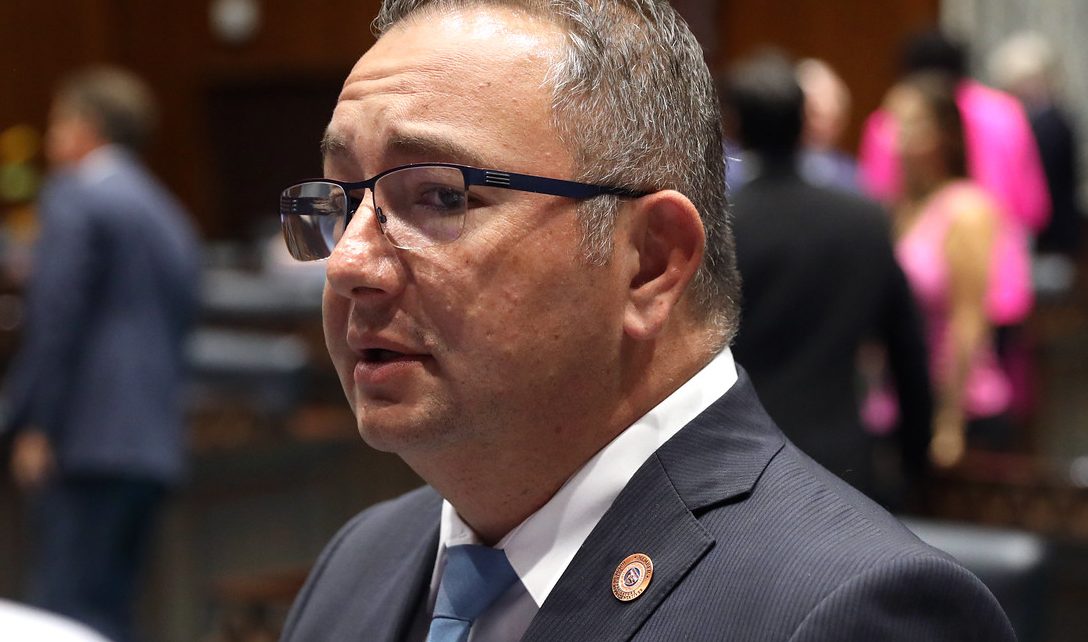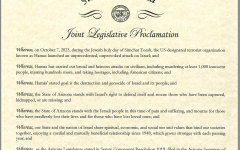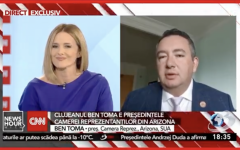
Speaker of the House Ben Toma speaking on the floor of the Arizona House of Representatives at the Arizona State Capitol building in Phoenix, July 31, 2023. (Photo: Gage Skidmore)
Toma Issues HCR2060 to Prevent Payouts to Illegals
Cites $2.3B cost to the state as impetus for the rule tightening
By Steve Kirwan, February 23, 2024 3:30 pm
Arizona’s House Speaker Ben Toma (R-27) issued a Concurrent Resolution on February 14, 2024, dubbed the Protecting Arizona Against Illegal Immigration Act, that tightens up state rules regarding the employment of and public benefits for illegal border crossers. On an unsurprising party-line vote, the House Appropriations Committee passed the Resolution, which expands provisions of the state’s E-Verify program and mandates more stringent welfare program record-keeping.
The resolution mandates include:
- Requiring a municipality or county that receives state monies for public welfare programs to use E-Verify to ensure that adult recipients are lawfully present in the United States;
- Directing municipalities and counties to keep citizen verification records for a minimum of three years;
- Regulating public welfare programs that use state monies due to the economic and fiscal impact of illegal immigration on Arizona;
- Defining obstruction of the legal duty to use E-Verify as a class 6 felony.
- Modifying the definition of employer to include a person or organization using contract labor;
- Mandating that independent contractors or subcontractors are subject to the same E-Verify requirements as an employer;
- Requiring an agency to use E-Verify before issuing a document or license and maintaining such record for at least three years.
- Defining agency and license;
- Entitling this Act the Protecting Arizona Against Illegal Immigration Act;
- Directing the Secretary of State to submit this proposition to the voters at the next general election.
- Making other technical changes to related rulings.
These new rules will enhance existing statutes requiring employers to use the federal E-Verify system to determine applicant and employee immigration status. Violation of the statute carries penalties of up to $10,000 in fines and potential imprisonment. As expected, Democrats objected to the enhanced rules, claiming employers already have difficulties finding workers. Toma disagrees. Toma believes that one way to reduce illegal immigration is to make hiring illegals more difficult and costly.
“What about basic fairness for hardworking Arizonans that actually comply with the law?” he asked. “How can they afford to compete under those circumstances.” He added, “Our border is being overrun by illegal aliens.”
Lena Avalos, speaking for Living United for Change in Arizona, a liberal, pro-illegal immigration political advocacy group, argued against the HRC. She claims that all people, regardless of immigration status, pay their “fair share,” including $213M in sales taxes. Toma disagrees, citing $2.3B in annual costs to the state, a figure provided by the Federation for American Immigration Reform.
Democrats have long argued that tougher E-Verify rules criminalize people who come here in good faith, seeking a better life. But Toma disagrees with the “good faith” argument.
“If they worked in good faith but they know they’re illegal, and especially if they’ve used forged documents and a forged identity in order to be able to get hired in the first place, I’m not sure you could say that is in good faith,” he said.
Rep. Matt Gress (R-4) sees it in simpler terms. “Arizona is not a sanctuary state,” he said. “And this legislation ensures that it never will be.”
Toma structured HRC2060 as a ballot measure set for inclusion in the November 2024 election. As such, it bypasses the need for approval by Governor Katie Hobbs, who has previously indicated that she would veto any such bill crossing her desk.
- Rivero Reacts to LTC Patient Threats from Biden’s ‘Inflation Reduction Act’ - November 4, 2025
- Gillette Identifies HR1’s Medicaid Changes as Corrections, not Cuts - October 10, 2025
- Carroll Touts SEMICON WEST Win as Proof of AZ’s Tech Bonafides - October 9, 2025




